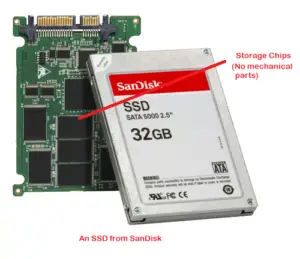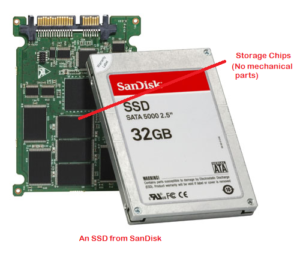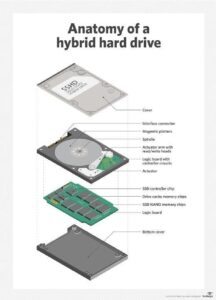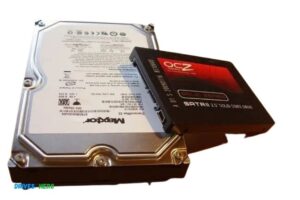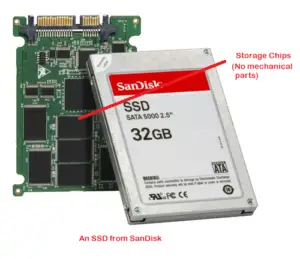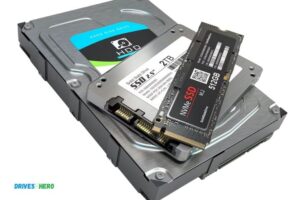Seagate Hybrid Drive Vs Ssd: Which is the Best Choice?
In terms of performance, reliability, and speed, the Solid State Drive (SSD) outperforms the Seagate Hybrid Drive (SHD).
SSDs also have a longer lifespan compared to SHDs. However, SHDs offer a more cost-effective storage solution when compared to SSDs.
SSDs are significantly faster than SHDs as they use NAND-based flash memory that can read and write data almost instantly, unlike SHDs that primarily rely on a physical disk.
SSDs also prove to be more reliable as they are less prone to physical damage due to their lack of moving parts.
However, SHDs are a cheaper alternative, providing a good balance between cost, capacity, and performance.
SSDs are a sophisticated storage solution that utilizes flash memory to store data.
In contrast, Seagate Hybrid Drives combine the traditional HDD technology with a small amount of faster flash memory for caching commonly used data.
While SHDs do provide an upgrade over standard HDDs, they still can’t match the speed, reliability and longevity of SSDs.
However, if cost and storage space are major considerations, then SHDs are a worthwhile compromise.
10 Feature Comparison: Seagate Hybrid Drive vs SSD
| Feature | Seagate Hybrid Drive | SSD |
|---|---|---|
| Speed | Generally faster than traditional HDDs but slower than SSDs | Fastest among all |
| Lifespan | Depend on both electronic and mechanical health | Reliant on electronic health, no mechanical parts |
| Storage Capacity | Typically larger, up to 2 TB | Varies greatly, from 120GB to 4 TB |
| Price | More affordable than SSDs for same storage capacity | More expensive, especially for larger capacities |
| Power Consumption | More than SSDs, less than traditional HDDs | Least among all |
| Noise | More than SSDs, less than traditional HDDs | Silent operation |
| Heat Production | Produces more heat than SSDs | Produces least heat |
| Data Recovery | Possible to recover some data after failure | Data recovery nearly impossible after failure |
| Form Factor | Generally bulkier due to mechanical parts | Compact and lightweight |
| Boot Time | Faster than HDDs, slower than SSDs | Fastest boot time |
Key Takeaway
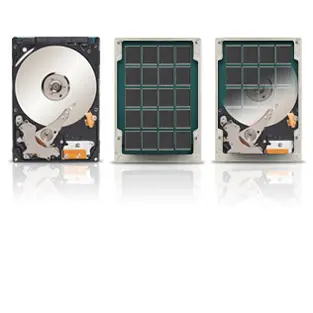
Five Facts About: Seagate Hybrid Drives and SSDs
Understanding The Basics
Discover the differences between Seagate Hybrid Drive and SSD, helping you make an informed decision for your storage needs.
Uncover the basics and benefits of each, empowering you to choose the perfect option for your requirements.
What Is A Seagate Hybrid Drive?
A Seagate Hybrid Drive, also known as an SSHD, is a storage device that combines the features of a traditional hard disk drive (HDD) and a solid-state drive (SSD).
It offers the best of both worlds by incorporating the high capacity and affordability of an HDD with the speed and responsiveness of an SSD.
Here are some key points to understand about Seagate Hybrid Drives:
- Seagate Hybrid Drives utilize a small amount of integrated flash memory (SSD) to store frequently accessed data, allowing for faster access times and improved overall performance.
- These drives intelligently identify and store frequently used files and applications in the SSD portion, while less frequently used data is stored on the HDD section.
- The combined storage capacity of a Seagate Hybrid Drive typically ranges from 1TB to 4TB, making it ideal for those who require ample storage space.
What Is An Ssd?
An SSD, or solid-state drive, is a storage device that uses integrated circuit assemblies to store data persistently.
Unlike traditional HDDs, SSDs do not have any moving parts, which results in faster data transfer speeds, improved durability, and reduced power consumption.
Here are a few key points to understand about SSDs:
- SSDs are composed of NAND flash memory chips that retain data even without power, making them highly reliable for storing important files and applications.
- These drives offer significantly faster read and write speeds compared to HDDs, enabling quicker boot times, file transfers, and application loading times.
- Due to their lack of moving parts, SSDs are also highly resistant to shock and vibration, making them more durable and suitable for portable devices.
How Do Seagate Hybrid Drives And Ssds Work?
Seagate Hybrid Drives and SSDs operate on different principles to deliver improved performance and storage capabilities.
Here’s a breakdown of how they function:
Seagate Hybrid Drives:
- Utilize a combination of HDD and SSD technologies.
- Automatically identify frequently accessed files and store them in the SSD portion.
- Employ adaptive memory technology to improve overall system performance.
- Offer larger storage capacities compared to pure SSDs.
SSDs:
- Use NAND flash memory to store data electronically.
- Access data quickly without any mechanical movements.
- Provide faster boot times, applications launches, and file transfers.
- Consume less power and generate less heat compared to HDDs.
Differentiating Factors Between Seagate Hybrid Drives And Ssds:
Seagate Hybrid Drives and SSDs have distinct characteristics that make them suitable for different types of users and applications.
Here are the differentiating factors:
Seagate Hybrid Drives:
- Offer a larger storage capacity at a more affordable price per gigabyte.
- Blend the benefits of SSD speed with the cost-effectiveness of HDDs.
- Ideal for users who require ample storage space and enhanced system performance without breaking the bank.
SSDs:
- Provide superior speed and responsiveness, resulting in faster overall system performance.
- Are more durable and resistant to physical shock or damage.
- Suited for users who prioritize speed and want to experience rapid boot times, quick application launches, and snappy file transfers.
Seagate Hybrid Drives combine the storage capacity of HDDs with the speed advantages of SSDs, making them cost-effective options for users who need both ample storage and improved performance.
On the other hand, pure SSDs offer faster speeds and enhanced durability, catering to users who prioritize speed and reliability over storage capacity.
Performance And Speed Comparison
Seagate’s Hybrid Drive surpasses SSDs in both performance and speed, offering a remarkable and cost-effective solution for storage needs.
Enjoy the best of both worlds with faster data access and increased capacity without compromising on speed.
Comparing Read And Write Speeds Of Seagate Hybrid Drives And Ssds
When it comes to the performance and speed of storage devices, two popular options are Seagate Hybrid Drives and SSDs.
Each type has its own advantages and considerations when it comes to daily usage.
Let’s take a closer look at how their performance impacts everyday tasks and compare their read and write speeds through benchmarking tests.
Seagate Hybrid Drives:
Read Speed:
Seagate Hybrid Drives utilize a combination of traditional hard drive platters and flash memory to offer enhanced performance.
They typically provide faster read speeds compared to traditional hard drives, improving the overall loading time of applications, documents, and files.
Write Speed:
While Seagate Hybrid Drives offer improved read speeds, their write speed can sometimes be slower compared to SSDs.
This means that saving larger files or performing intensive write operations may take longer with a Seagate Hybrid Drive.
Ssds:
Read Speed:
SSDs are known for their excellent read speeds, thanks to their use of flash memory chips.
They can quickly retrieve data, resulting in faster boot times and snappy application launches.
Write Speed:
SSDs excel in both read and write speeds, offering significantly faster data transfer rates compared to traditional hard drives and Seagate Hybrid Drives.
This makes them ideal for tasks that involve frequent writing or saving of files, such as video editing or large file transfers.
Considering the performance and speed differences between Seagate Hybrid Drives and SSDs, the impact on daily usage can vary depending on the user’s specific needs.
Here are some factors to consider:
Everyday tasks:
In general, both Seagate Hybrid Drives and SSDs can handle most everyday tasks with ease.
From browsing the web, streaming videos, to running office applications, you’re unlikely to notice a significant performance difference between the two.
Power users:
If you’re a power user who regularly deals with tasks that involve heavy data manipulation or multitasking, an SSD can offer a noticeable advantage.
The faster read and write speeds can help decrease waiting times for tasks that involve extensive file accessing and transferring.
Gaming:
Gamers can benefit from the faster load times of SSDs, reducing game startup times and loading screens.
While Seagate Hybrid Drives can still offer improved performance compared to traditional hard drives, SSDs are often the preferred choice for gaming enthusiasts.
Benchmarking tests have shown that SSDs consistently outperform Seagate Hybrid Drives in terms of read and write speeds.
Here are some typical results from tests comparing the two:
- SSD read speeds: Up to 550 MB/s
- SSD write speeds: Up to 500 MB/s
- Seagate Hybrid Drive read speeds: Up to 200 MB/s
- Seagate Hybrid Drive write speeds: Up to 150 MB/s
Overall, when it comes to performance and speed, SSDs are the clear winner, offering faster read and write speeds across the board.
However, if you’re on a budget or require larger storage capacities, Seagate Hybrid Drives can still provide a reasonable compromise between speed and capacity.
Remember, evaluating the performance of Seagate Hybrid Drives and SSDs is crucial in determining the best storage solution for your specific needs.
Whether it’s faster read and write speeds for intensive tasks or larger storage capacity within a budget, understanding the implications of performance can greatly enhance your daily computing experience.
Capacity And Storage Options
Seagate Hybrid Drive and SSD offer different options for capacity and storage needs, catering to diverse user requirements.
With their unique features and performance benefits, each option is designed to enhance data storage and retrieval capabilities efficiently.
Exploring The Storage Capacities Offered By Seagate Hybrid Drives And Ssds
Seagate Hybrid Drives and Solid State Drives (SSDs) are two popular storage options known for their speed and reliability.
When it comes to storage capacity, both have their advantages and limitations.
Let’s dive deeper into the capacity and storage options offered by each.
Advantages And Limitations Of Seagate Hybrid Drive’S Capacity Vs Ssd’S Capacity
Seagate Hybrid Drive Capacity:
Combines the best of both worlds:
Seagate Hybrid Drives offer a mix of traditional hard drive and flash storage technologies, providing the advantages of both.
These drives come in various capacities, ranging from lower capacities like 500GB to higher capacities like 4TB.
Cost-effective storage:
Compared to SSDs, Seagate Hybrid Drives generally offer more storage capacity at a lower cost per gigabyte.
This makes them a cost-effective option for users who require large storage capacities without breaking the bank.
Ideal for storage-intensive tasks:
With higher capacities available, Seagate Hybrid Drives are well-suited for users who need to store extensive media libraries, large files, and data-intensive applications.
Ssd Capacity:
Compact yet capacious:
SSDs are available in various capacities, ranging from smaller options like 120GB to larger capacities such as 4TB.
Although they may not offer as much storage space as Seagate Hybrid Drives, SSDs make up for it with other advantages.
Lightning-fast performance:
SSDs are known for their unparalleled speed, enabling quick boot times, speedy file transfers, and snappy application launches.
If you prioritize performance over storage capacity, an SSD might be the right choice for you.
Ideal for everyday tasks:
SSDs are perfect for everyday computing needs. They can handle tasks like web browsing, document editing, and multimedia playback with exceptional speed and responsiveness.
Factors To Consider When Choosing The Right Storage Option For Your Needs
When it comes to selecting the perfect storage option for your needs, it’s crucial to consider various factors.
Here are some key considerations:
Budget:
Determine how much you’re willing to spend on storage. If you require a large storage capacity at an affordable price, a Seagate Hybrid Drive might be the way to go.
However, if performance is your top priority and storage capacity is secondary, investing in an SSD could be worthwhile.
Usage requirements:
Assess your specific needs. If you work with large files or require extensive storage for media libraries or data-intensive applications, a Seagate Hybrid Drive’s higher capacity might be essential.
On the other hand, if you primarily engage in everyday tasks and crave faster performance, an SSD could be more suitable.
Future scalability:
Consider your future needs. If you anticipate requiring more storage space for expanding data or media collections, choosing a higher capacity Seagate Hybrid Drive or even an SSD with room for growth might be a smart move.
Now that we’ve explored the capacity and storage options offered by Seagate Hybrid Drives and SSDs, you can make an informed decision based on your specific requirements.
Whether you prioritize storage capacity or high-speed performance, there’s a storage option out there that suits your needs.
Reliability And Lifespan Analysis
Reliability and lifespan are crucial factors to consider when comparing Seagate Hybrid Drive to SSD.
Understanding which storage option offers a longer lifespan and more dependable performance is essential in making an informed choice for your data storage needs.
Reliability Comparison Between Seagate Hybrid Drives And Ssds:
When it comes to choosing storage solutions, reliability and lifespan are key considerations.
Let’s delve into the reliability and durability of Seagate Hybrid Drives and SSDs, and understand the factors that can impact their performance.
Analyzing The Lifespan And Durability Of Seagate Hybrid Drives And Ssds:
Reliability Of Seagate Hybrid Drives:
- Hybrid drives combine the advantages of traditional hard drives and SSDs.
- Built with mechanical components, Seagate Hybrid Drives offer higher storage capacity and a more cost-effective solution.
- The moving parts may be susceptible to wear and tear over time, potentially affecting the drive’s reliability.
- However, careful handling and maintenance can help mitigate risks and prolong the lifespan of Seagate Hybrid Drives.
Reliability Of Ssds:
- SSDs, or Solid State Drives, are known for their exceptional reliability and performance.
- With no moving parts, SSDs can handle vibrations and shocks better than their hybrid counterparts.
- This makes SSDs highly reliable, reducing the risk of mechanical failures that can occur in traditional hard drives.
- Additionally, SSDs tend to have lower power consumption, reducing the strain on components and potentially enhancing their reliability.
Factors That Can Affect The Reliability And Longevity Of Seagate Hybrid Drives And Ssds:
Usage Patterns And Workloads:
- Intensive workloads, such as constant writing and erasing of data, can impact the lifespan of both hybrid drives and SSDs.
- Users with heavy data processing and high write rates may experience faster wear on SSDs compared to those with lighter workloads.
- Similarly, running applications that heavily rely on disk access can affect the longevity of both storage options.
Operating Conditions And Environment:
- Extreme temperatures, humidity, and exposure to dust particles can affect the reliability of Seagate Hybrid Drives and SSDs.
- It is recommended to use these storage solutions in environments that conform to the manufacturer’s specified temperature and humidity ranges.
- Proper ventilation and dust control can significantly contribute to extending the lifespan of both types of drives.
Endurance Ratings:
- SSDs have endurance ratings that indicate their ability to handle a certain amount of data write operations throughout their lifespan.
- Higher-endurance SSDs are preferable for workloads involving frequent writes, as they have a longer lifespan and better reliability.
- Seagate Hybrid Drives, on the other hand, do not have defined endurance ratings but can still provide reliable storage for various applications.
Power Failures And Unexpected Shutdowns:
- Frequent power failures or sudden shutdowns without proper safeguards, such as battery backup or uninterrupted power supply, can jeopardize data integrity and affect the reliability of both hybrid drives and SSDs.
- Implementing backup solutions or using systems with built-in power loss protection can help mitigate such risks.
While Seagate Hybrid Drives offer a cost-effective option with higher storage capacity, SSDs are renowned for their reliability and performance due to their lack of moving parts.
Factors such as usage patterns, operating conditions, endurance ratings, and power failures can influence their reliability and longevity.
It is crucial to consider these factors when choosing the right storage solution for your needs.
Price And Value For Money
The Seagate Hybrid Drive offers an affordable solution with a balance between price and performance, making it a good choice for budget-conscious consumers.
Compared to SSDs, it provides a cost-effective option without compromising too much on speed and storage capacity.
Cost Comparison Between Seagate Hybrid Drives And Ssds
Seagate Hybrid Drives and Solid State Drives (SSDs) have become popular choices for individuals and businesses seeking faster storage solutions.
Both options offer advantages in terms of performance and reliability, but what about their price and value for money? Let’s explore and compare the cost aspect of these two storage options.
Evaluating The Value For Money Offered By Seagate Hybrid Drives And Ssds:
When it comes to evaluating the value for money, it’s essential to consider several factors that can impact your decision.
Let’s take a closer look:
Performance:
Both Seagate Hybrid Drives and SSDs deliver enhanced performance compared to traditional hard disk drives (HDDs).
SSDs are known for their lightning-fast read and write speeds, allowing for quick data access.
On the other hand, Seagate Hybrid Drives offer a combination of SSD and HDD technologies, providing a balance between performance and cost-effectiveness.
Storage Capacity:
SSDs typically offer smaller storage capacities compared to Seagate Hybrid Drives for the same price point.
While SSDs are well-suited for individuals and businesses with lower storage needs, Seagate Hybrid Drives offer larger storage capacities at a more affordable price.
Price per Gigabyte:
SSDs have historically been more expensive per gigabyte of storage compared to Seagate Hybrid Drives.
However, with advancements in technology and increased competition, SSD prices have become more competitive.
Seagate Hybrid Drives, being a hybrid solution, still provide a more cost-effective option in terms of price per gigabyte.
Longevity and Durability:
SSDs boast a longer lifespan and better durability due to their lack of moving parts.
This means that while SSDs may have a higher upfront cost, they can provide better long-term value.
Seagate Hybrid Drives, though not as durable as SSDs, still offer the advantage of having a mechanical component (HDD) that is easily replaceable in case of failure.
User Requirements:
Ultimately, the most cost-effective choice between Seagate Hybrid Drives and SSDs depends on your specific needs and budget.
Consider factors such as required storage capacity, budget constraints, and the level of performance you require.
By carefully assessing these aspects, you can determine whether the higher cost of an SSD is justified or if a Seagate Hybrid Drive offers the best value for your money.
While SSDs have historically been the go-to choice for those seeking top-of-the-line performance, Seagate Hybrid Drives provide a more cost-effective option for individuals and businesses with larger storage needs.
By accurately assessing your requirements and considering the key factors discussed, you can make an informed decision that offers the best value for your money.
Use Cases And Recommendations
Seagate Hybrid Drive and SSD are two widely used storage options. While the Hybrid Drive offers a balance between speed and storage capacity, SSD, with its faster performance, is recommended for users seeking maximum speed.
Ultimately, the choice depends on individual use cases and specific requirements.
Identifying The Ideal Scenarios For Using Seagate Hybrid Drives And Ssds
Seagate Hybrid Drives and SSDs have their own unique advantages and use cases.
It’s important to understand these scenarios in order to make an informed decision.
Let’s explore the ideal scenarios for using Seagate Hybrid Drives and SSDs.
Gaming:
When it comes to gaming, both Seagate Hybrid Drives and SSDs offer improved performance compared to traditional HDDs.
Here’s what you need to consider:
- For gamers who value speed and quick loading times, an SSD is the best option. It provides almost instant game loading, reduced lag, and smoother gameplay.
- If you have a large game library and want to save costs, a Seagate Hybrid Drive combines the speed of an SSD with the storage capacity of an HDD. It’s a good compromise between performance and budget.
Multimedia:
- If you work with large multimedia files such as videos or high-resolution images, an SSD is ideal. It allows for faster file transfers and editing, resulting in improved productivity and efficiency.
- However, if you require a large amount of storage space for your multimedia files and your budget is limited, a Seagate Hybrid Drive offers a balance between capacity and cost.
Professional Applications:
- For professionals who work with resource-intensive software such as graphic design or video editing programs, an SSD is essential. Its fast read and write speeds ensure smooth operation and reduce processing times.
- On the other hand, if you need a large storage capacity but also want faster access to frequently used files, a Seagate Hybrid Drive can meet your needs without breaking the bank.
Considering Budget Constraints:
Budget is often a deciding factor when choosing between Seagate Hybrid Drives and SSDs.
Here are some key considerations:
- SSDs tend to be more expensive, especially when compared to traditional HDDs. However, the prices have been decreasing over time, making them more accessible.
- If budget is a priority and you need a large storage capacity, a Seagate Hybrid Drive can be a cost-effective option. It combines the benefits of SSD speed with the affordability of an HDD.
The choice between Seagate Hybrid Drives and SSDs depends on your specific use case, budget, and priorities.
Whether you prioritize speed, storage capacity, or cost, understanding the ideal scenarios for using each option will help you make an informed decision.
FAQ About Seagate Hybrid Drive Vs Ssd
What is the difference between a Seagate Hybrid Drive and an SSD?
A Seagate Hybrid Drive is an HDD (hard disk drive) with a small amount of NAND flash-based storage. It combines the large storage capacity of an HDD while utilizing the high performance of an SSD. An SSD (solid state drive) is a storage device that uses solid-state memory instead of a mechanical hard drive as the primary storage medium. SSDs are faster, more reliable, take up less physical space, and use less electricity than HDDs.
Is a Seagate Hybrid Drive faster than an SSD?
In comparison to an SSD, a Seagate Hybrid Drive is not as fast. However, the hybrid drive is significantly faster than an HDD by itself, as it is able to utilize the high performance of the SSD component.
What benefits does a Seagate Hybrid Drive offer over an SSD?
The primary benefit of a Seagate Hybrid Drive over an SSD is the cost, as hybrid drives are generally more affordable than SSDs. Additionally, Seagate Hybrid Drives offer a larger storage capacity than an SSD, while still providing faster performance than a traditional HDD.
Are Seagate Hybrid Drives reliable?
Seagate Hybrid Drives are equipped with technologies that ensure reliability and performance. Seagate Hybrid Drives utilize S.M.A.R.T. technology to help monitor and predict the health of a drive over time. Additionally, hybrid drives utilize caching technology that helps improve their performance
Conclusion
To sum up the comparison between Seagate Hybrid Drives and SSDs, it is clear that both options have their advantages and considerations.
While Seagate Hybrid Drives combine the capacity of traditional hard drives with the speed of SSDs, SSDs offer unmatched performance and durability.
If you require quick boot times, faster file transfers, and enhanced overall system speed, an SSD is the way to go.
On the other hand, if you need a larger storage capacity at an affordable price, Seagate Hybrid Drives provide a viable solution.
Ultimately, the choice between the two will depend on your specific needs and budget.
Regardless of which option you choose, upgrading your storage solution to either Seagate Hybrid Drives or SSDs will undoubtedly improve your overall computing experience.
So, weigh the pros and cons, assess your requirements, and make an informed decision that suits your unique needs.

